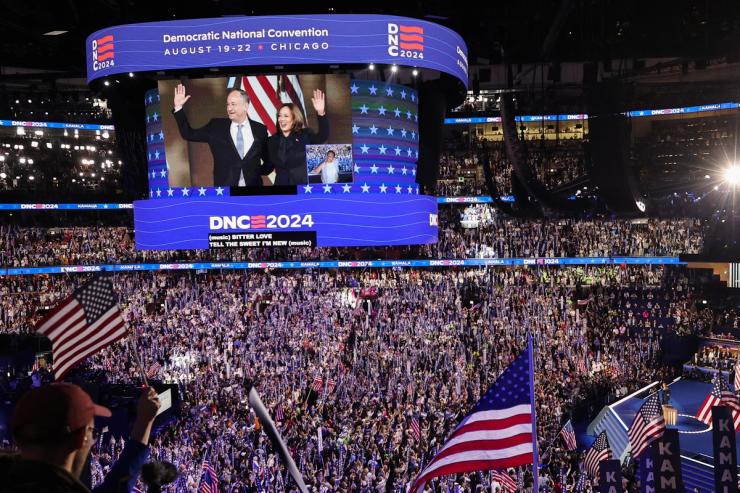The News
Vice President Kamala Harris made only a fleeting reference to climate change and clean energy jobs in her acceptance speech for the Democratic presidential nomination on Thursday, capping a convention that has been muted on arguably the crowning achievement of Joe Biden’s presidency.
“The freedom to breathe clean air, drink clean water, and live free from the pollution that fuels the climate crisis” are at stake in the election, Harris warned. But she didn’t mention the Inflation Reduction Act and the domestic manufacturing renaissance it spurred, or give any indication of how her approach to energy and climate may differ from Biden’s, something many climate advocates had hoped to hear in the convention.
In this article:
Tim’s view
Climate is a third rail for the Harris campaign. Anything she might say about the need to curb fossil fuel use risks alienating swing voters, especially in critical oil and gas states like Pennsylvania. Conversely, pointing to the record-high oil and gas production achieved under Biden is clearly a non-starter with the climate activists that make up an important part of her base. So there’s little to be gained from raising the issue at all, especially since polling indicates that climate isn’t something that most voters care much about either way.
“Its salience has simply diminished, especially in the face of cost and consumer concerns,” Alyssa Cass, chief strategist at the public opinion firm Blueprint, told me. In a poll of 2,300 voters last month, Blueprint found that messaging around Harris’ global climate leadership and her role in passing infrastructure legislation were turnoffs, and that reminding voters of her role in prosecuting oil companies was much less effective than focusing on protecting Medicare and abortion rights.
That puts the campaign in a predicament, because the most important and successful economic policy of the Biden administration, the IRA, was fundamentally a climate bill. But whereas Biden explicitly made fighting climate change a trademark issue, Harris seems more comfortable to let it play out in the background. Judging from the convention stage, the campaign’s strategy has been to minimize mentions of climate catastrophe; keep talk of IRA-related job growth fairly vague and less prominent than housing, inflation, and other issues; and delegate what climate conversation there is to surrogates like Interior Secretary Deb Haaland and Rep. Maxwell Frost (D-Fla.), both of whom focused on climate and the IRA in their speeches last night.
Climate activists are following the campaigns’ cues, said Jack Pratt, senior political director at EDF Action, which was among a set of climate advocacy groups that launched a $55 million pro-Harris ad campaign this week: Its ads trumpet clean energy jobs, but don’t mention the IRA by name, and are framed around the issues of corporate accountability and price gouging, rather than climate.
“The best thing we can do for climate advocacy is to make sure Harris wins,” Pratt said. “It’s not the moment to tell the tale of the IRA. The point is to support the act as a whole. To play your role really well, sometimes you’re in the background.”
One risk of that strategy is that it could allow Harris’s opponents to hijack the narrative: Brian Kemp, the Republican governor of Georgia, tweeted yesterday about his state’s strong run of job growth “despite the disastrous Biden-Harris agenda,” even though many or most of those jobs are related to IRA-enabled projects. Harris needs to be much more specific about her climate agenda, Collin Rees, political director at the activist group Oil Change U.S., said in a statement: “We’ll be watching closely to ensure Harris follows through on her climate promises and becomes the climate president we desperately need.”
Room for Disagreement
Voters who really care about climate aren’t likely to vote for Donald Trump, so there’s little need for Harris to sell herself as the pro-climate candidate. And talking about the clean energy as an economic imperative rather than an environmental one is not only true, but helps insulate Harris from criticism from the Trump camp that she’s a dangerous radical. It adds up to the same thing anyway, said Peter Maysmith, senior vice president of campaigns at the League of Conservation Voters: “It may not be those words, per se, but that doesn’t matter.”


